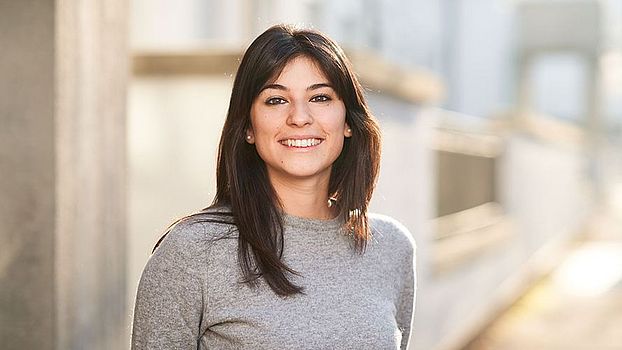/ Forschung
With mirrors, lasers and finesse

Doctoral candidate Grazia Raciti researches the dynamics of phonons as part of the Eucor program QUSTEC. Her lab experiments rely on mirrors, lasers and lots of finesse. When she isn't tinkering with gadgets, she helps undergraduates with their experiments.
Doctoral candidate Grazia Raciti researches the dynamics of phonons as part of the Eucor program QUSTEC. Her lab experiments rely on mirrors, lasers and lots of finesse. When she isn't tinkering with gadgets, she helps undergraduates with their experiments.
Her coronavirus mask may hide her facial expressions, but Grazia Raciti makes up for it with gestures. She's sitting in the cafeteria of the Department of Physics and with sweeping arm movements talking about phonons, lasers and mirrors. Phonons are lattice vibrations in a solid object and can occur when a laser beam hits a crystal. Phonons have various properties and a different spectrum depending on the material.
The large room seems deserted, with the chairs pushed in neatly under the long tables. Despite the recommendation to work from home, the researcher can be here to work on her experimental design in the Nanophononics Groups laboratory, respecting the shifts with her colleagues. She has spent the past five months properly aligning the laser beams and mirrors for her experiment.
“It's precision work. Physics requires not just brain work, but finesse,” says the researcher. Her hands trace the lasers in the air, showing how they are guided to various materials at different times with the help of mirrors. In this setup you can excite a phonon mode and follow in time how its spectrum changes. “By studying phonon evolution in time we can investigate the heat transport in microstructures”, she explains.
From the Arno to the Rhine
Raciti came to Basel as part of the QUSTEC program (see box). She grew up in Sicily and dreamed of combining her enthusiasm for mathematics with something more “tangible” even at school. “Studying experimental physics was the logical next step for me,” she recalls. After her bachelor's degree at the University of Catania, she completed a master's at the University of Pisa.
“Physics research thrives on international collaboration and sharing. That's why I knew I had to leave Italy after my master's.” When she applied to Basel, she didn't know anything about the city yet. Curious, she did a Google image search and found something familiar: “The Rhine with the Middle Bridge reminded me of the Arno in Pisa and that immediately gave me confidence.”
She spends most of her time in the lab alone or with her postdoc; the rest of the research group she mainly sees on screens. She makes a hand motion to indicate the roof terrace: “In the summer, we often sat outside at lunch time.” She hopes that social lunches and coffee breaks will soon be possible again. Even though the coronavirus is making social contact difficult right now, the young researcher is feeling very comfortable at the Departement of Physics and loves the informal environment.
A love of teaching
The seminars at the Departement of Physics offer the opportunity to meet doctoral students from other projects and to share knowledge and experiences. But sometimes Raciti feels as though she's caught between two worlds. “As a doctoral candidate, I'm employed by the university. I teach and get paid for my research,” she says. At the same time, she still feels very connected to the student world: “In the beginning, everything was still so new and exciting. Sometimes I felt like a first-year.”
She also feels close to the students while she's teaching. She helps them with their experiments in the “Anfängerpraktikum Physik I” course. “Watching these students learn really makes me happy,” she adds. “That's why I want to pursue a university career doing a postdoc.”
Original text: https://www.unibas.ch/en/News-Events/News/Uni-People/With-mirrors--lasers-and-finesse.html
(Image by University of Basel, Oliver Hochstrasser)
